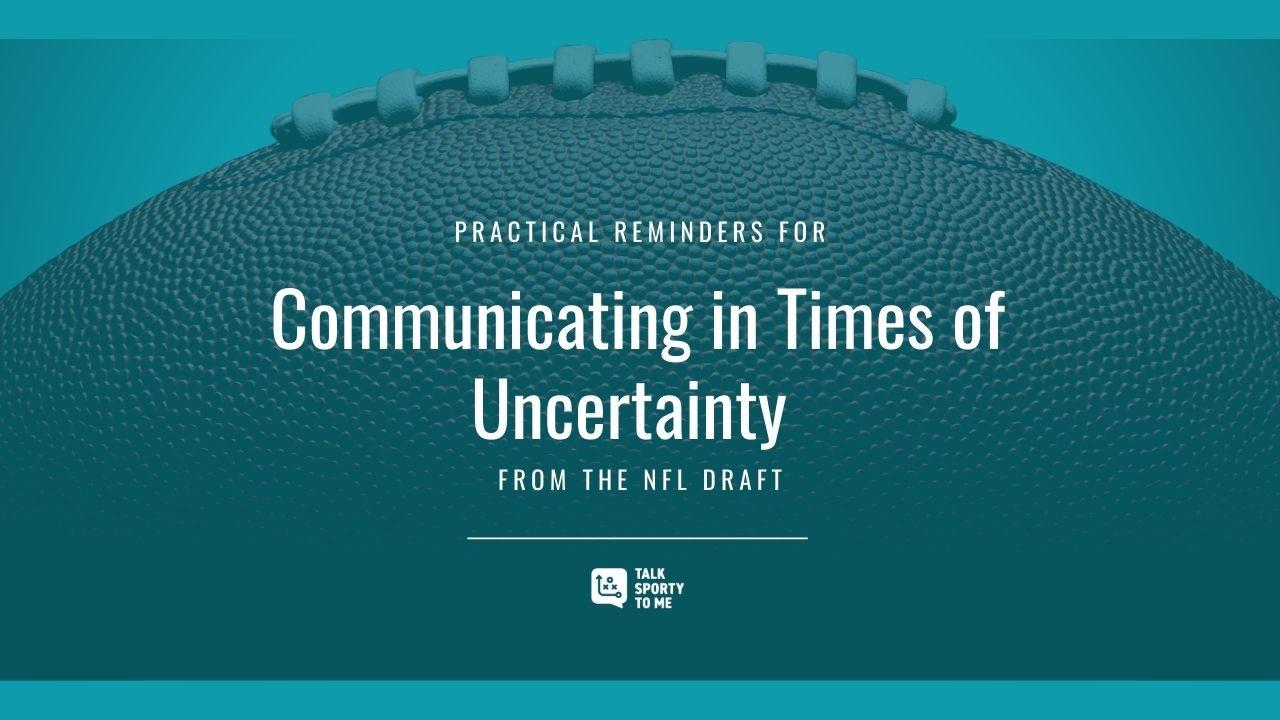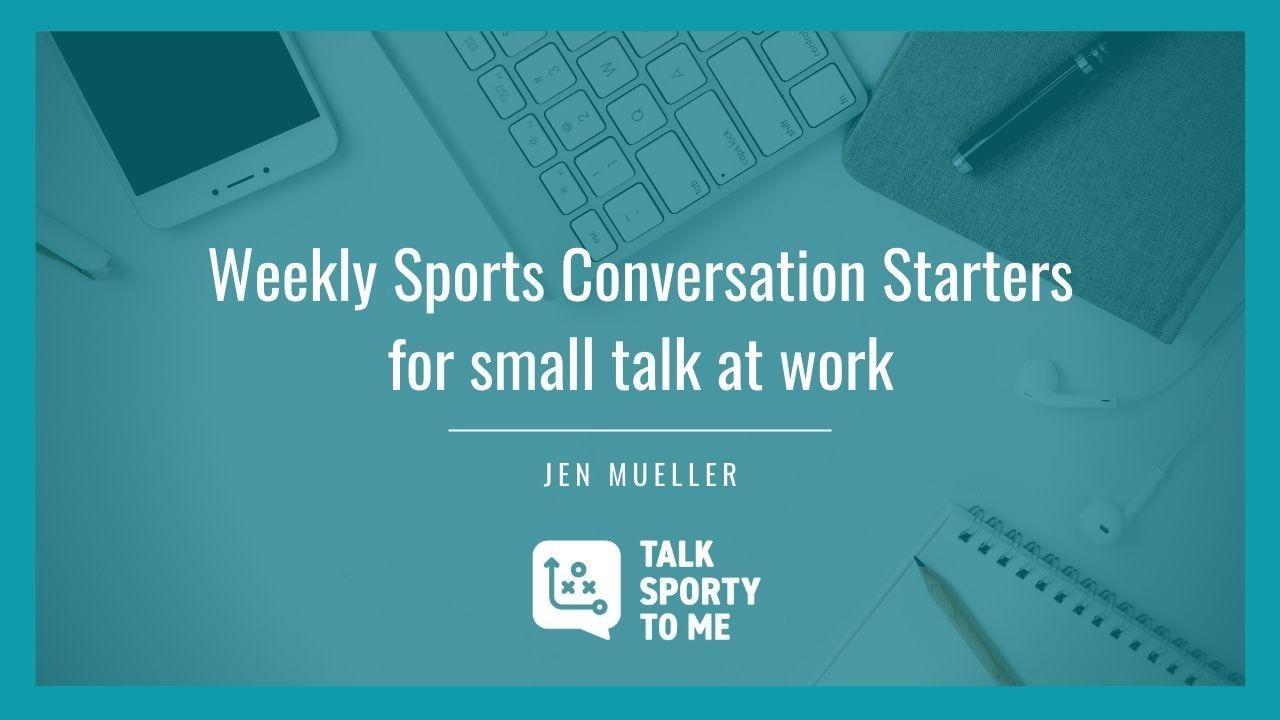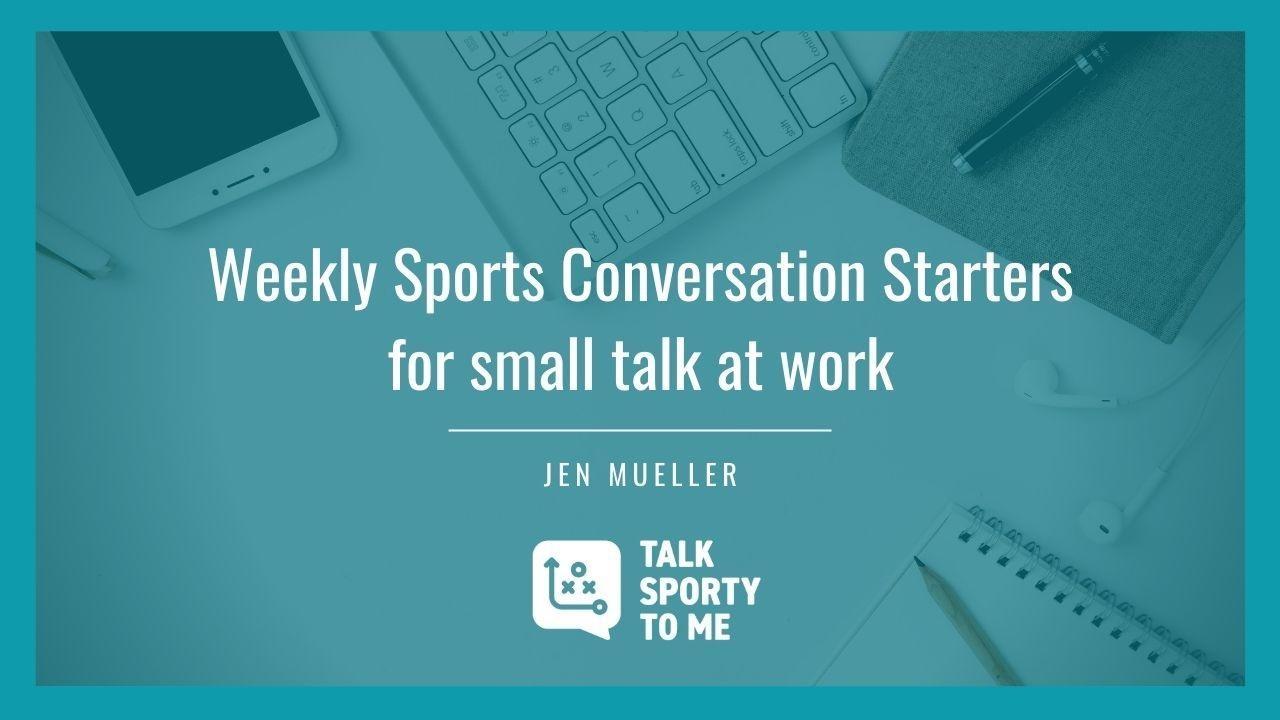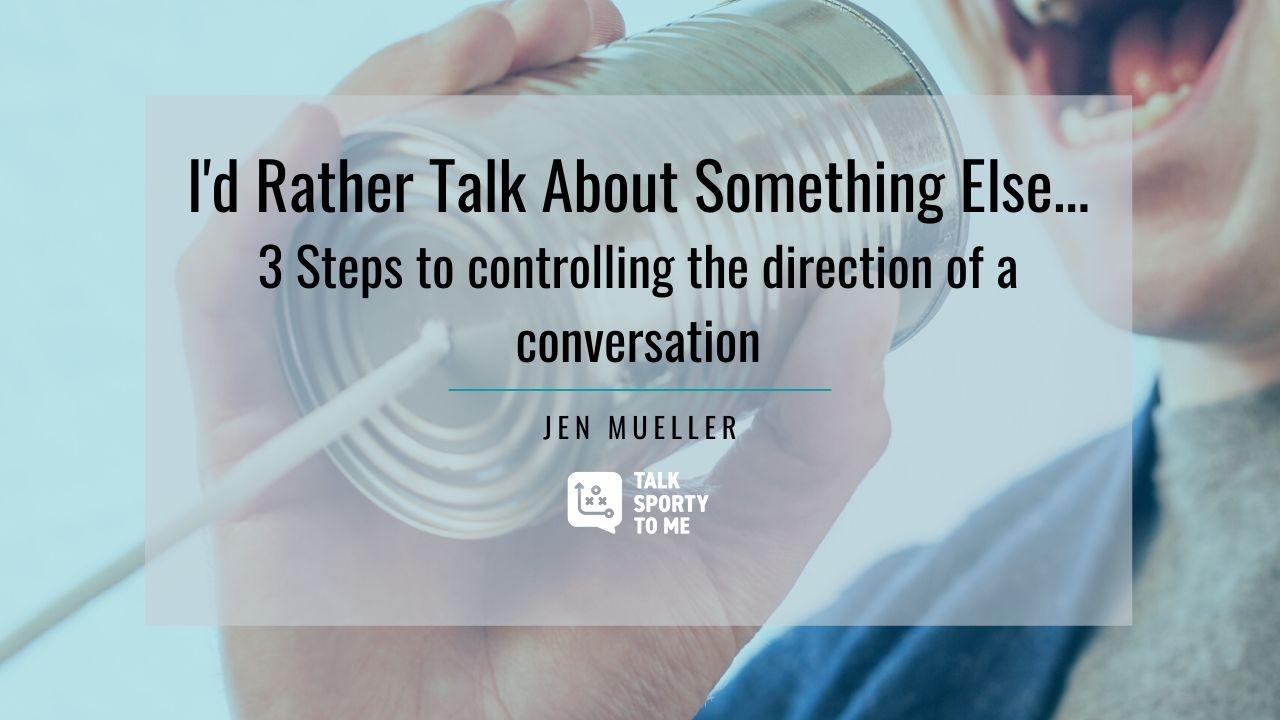I'M ONE TO TALK
Our Blog Posts will help you reach your full potential in becoming a confident conversationalist. New topics each week.
Communicating in Times of Certainty - Reminders from the NFL Draft

This week the NFL will releasing the entire 2020 schedule with the expectation the full season will be played and will start on time. Of course, there are contingencies in place if the COVID-19 crisis forces changes, but for right now fans can start looking ahead, getting excited for rivalry weekends and anticipating the debut of a new class of rookies.
Without even taking the field, the 2020 NFL Draft class has been part of NFL history by being the first (and perhaps only) class to be selected during an entirely virtual draft.
As the sideline reporter for the Seattle Seahawks and the founder of Talk Sporty to Me, I look for business parallels in the sporting events and press conferences I cover.
Talk Sporty to Me isn’t about clichés and metaphors, it’s about making sports fandom useful in business, relationship building and communication.
With that in mind, here are five quick takeaways from my experience as part of the Seahawks draft coverage and broadcast team...
Stop Comparing Virtual Meetings to Face-to-Face Interactions

Stop comparing virtual interactions to real-life, in-person conversations. They’re not the same thing.
Video conferencing, virtual happy hours and online training might be the next best thing to meeting in person, but they are not the same thing. There’s a big difference and big problem with making that assertion. Insisting video conferencing is “just like” face-to-face interactions discredits the feelings of exhaustion and fatigue that accompany virtual interactions.
If you go into the day thinking you’re going to have a conversation instead of preparing to be on camera, you’re setting yourself up for burn out, fatigue, exhaustion and frustration.
Take it from someone who’s been on camera and on TV for the last 14 years. I’m a sports broadcaster based out of Seattle. My colleagues and I can tell you from personal experience being on camera every day can be emotionally and mentally draining.
Communicating in a virtual...
Communicating With Remote Teams: Increase Audience Engagement

Audience participation requires prompting.
It's not enough to encourage your remote team to "weigh in with questions" or "let me know what you think." It sounds like you're encouraging engagement and interaction but you audience still doesn't have clear direction or guidelines.
- What should they be asking questions about?
- How long do they have to ask questions?
- What kind of thoughts would you like? Good ones? Bad ones?
Maintaining collaboration, teamwork and engagement are important aspects in leading a remote team, so don't leave it to chance. Be intentional about setting up scenarios that promote interaction and guarantee engagement.
Communicating With Remote Teams: Master 3-Sentence Summaries

Better communication shouldn't be interpreted as longer emails or more meetings.
Be careful about extolling the values of "over-communication" with your remote team because longer emails and more meetings don't mean better communication.
You still need to communicate your message in a way the other person (or people on your team) hear and process the information. More often than not, it's shorter, bite-sized nuggets.
If you don't account for short attention spans and additional distractions that come with working from home, you're missing the mark with communication.
Here's a concept we frequently use during TV broadcasts - 3-sentence summaries. Take a look.
Communicating With Remote Teams: Use E.T.A. for clarity in emails

Another WFH truth:
Your colleagues and team members have never been able to read your mind, but now they can't even read your facial expression, tone of voice, body language or get a read on your general demeanor.
That means they have no idea what to make of some of the emails you're sending.
Consider a note that says, "Call me when you get a chance." You know your motivation is to check in and see how your team member is coping with the work from home dynamic, but they don't know that unless you tell them. And until they know what the conversation is about, they're likely to jump to conclusions and stress out over the all the possible things you want to talk about because it's human nature to jump to the worst-case scenario.
Clarity is kindness, especially when sending emails in a work from home setting.
This is just one of the things to consider when communicating with remote teams. Download the the FREE e-book Communicating With Remote Teams for...
Sports Conversation Starters For Your Workweek

We’re going into week four of zero live sports on TV and my husband has decided the new go-to background TV programing is Food Network. Apparently me cooking every day is not entertaining enough. He has never once watched the food prep for his own dinner from start to finish. I digress.
We’re not the only ones changing our viewing habits. Everyone is looking for new things to watch and different things to talk about. Quite a few athletes and sports fans are entertaining themselves with virtual sports and still finding new sports headlines like these to talk about during the week.

Communicating With Remote Teams: Ask focused questions

"How are you?"
In "normal" times it's the appropriate thing to say when starting a conversation and part of the script we follow by default.
These days, that question is asked with sincerity and best intentions, but I'm willing to wager the answers fall short of expectations.
If you really want people to open up, share their story and reveal personal details you have to ask a more focused question.
"How are you?" is the equivalent of me, a sports broadcaster, striking up a conversation with a player by saying, "Tell me about the game." I fully expect the athlete to look at me, shrug and then say, "What part of the game do you want me to tell you about? The beginning, the middle, the end, the role I played, the effort of my teammates, the adjustments we made because of the opponent?"
(If he or she doesn't do that, they're being far too polite, because that is a terribly unprepared way for a reporter to start a conversation with an athlete.)
Open-ended...
Sports Conversation Starters for Your Workweek

I never thought I'd write a weekly blog about sports conversation starters without a single sports event on the calendar, or while social distancing is forcing most people to work from home.
Working remotely, suspending sports seasons, canceling the NCAA Tournament and delaying the start of the baseball season became necessary to combat the Coronavirus pandemic.
So why am I still talking about sports? Because sports fandom doesn't stop just because sports seasons on are hold.
There are still ways to include sports in your weekly conversations. You can read five ways to do that in the full blog.
In addition, small talk doesn't just take place in person. It will still take place before your video conference meetings, when you email colleagues throughout the day and when you text friends to see how they're passing the time at home.
With that in mind, and knowing there's new information seemingly every hour, here are a few sports conversation starters for you to...
I'd Rather Talk About Something Else... 3 Steps to Controlling the Direction of a Conversation

The hottest news topic isn’t always the one you want to talk about, even when it seems like that’s ALL anyone is talking about.
The coronavirus dominates our conversations as much as the headlines right now. While it can be helpful to talk through the latest information and comforting to know other people share the same feelings or concerns, engaging in that conversation over and over can also lead to anxiety and increased levels of stress and worry.
Stop having a stressful conversation on repeat by changing your approach to small talk.
If you would rather talk about something else, alter your approach to small talk. Try these three adjustments in the conversations you’re already having both remotely and in-person.
Dial in open-ended questions. You can’t count on anyone else to change the subject so control the direction of the conversation from the outset by asking a more targeted questions. Using “How are you?” or...
Sports Conversation Starters for Your Workweek

The topic dominating headlines isn’t always the best conversation starter.
I mean, how much more do you really want to talk about the coronavirus (And how much more should we say other than, “Please wash your hands.”)
Even with the uncertainty around some sporting events sports makes a great connection point. Look for a new blog post within the next 24 hours on how to direct conversations in more productive directions. For now, use these sports topics whether you’re talking face-to-face or via email.



